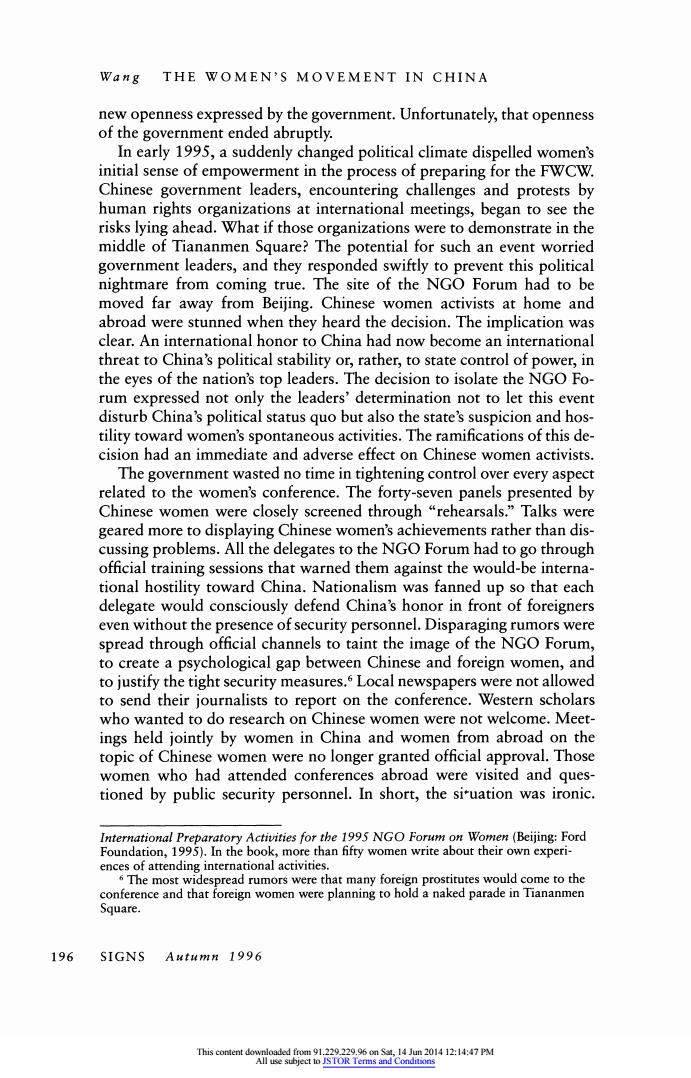正在加载图片...

Wang THE WOMEN'S MOVEMENT IN CHINA new openness expressed by the government.Unfortunately,that openness of the government ended abruptly. In early 1995,a suddenly changed political climate dispelled women's initial sense of empowerment in the process of preparing for the FWCW. Chinese government leaders,encountering challenges and protests by human rights organizations at international meetings,began to see the risks lying ahead.What if those organizations were to demonstrate in the middle of Tiananmen Square?The potential for such an event worried government leaders,and they responded swiftly to prevent this political nightmare from coming true.The site of the NGO Forum had to be moved far away from Beijing.Chinese women activists at home and abroad were stunned when they heard the decision.The implication was clear.An international honor to China had now become an international threat to China's political stability or,rather,to state control of power,in the eyes of the nation's top leaders.The decision to isolate the NGO Fo- rum expressed not only the leaders'determination not to let this event disturb China's political status quo but also the state's suspicion and hos- tility toward women's spontaneous activities.The ramifications of this de- cision had an immediate and adverse effect on Chinese women activists. The government wasted no time in tightening control over every aspect related to the women's conference.The forty-seven panels presented by Chinese women were closely screened through "rehearsals."Talks were geared more to displaying Chinese women's achievements rather than dis- cussing problems.All the delegates to the NGO Forum had to go through official training sessions that warned them against the would-be interna- tional hostility toward China.Nationalism was fanned up so that each delegate would consciously defend China's honor in front of foreigners even without the presence of security personnel.Disparaging rumors were spread through official channels to taint the image of the NGO Forum, to create a psychological gap between Chinese and foreign women,and to justify the tight security measures.5 Local newspapers were not allowed to send their journalists to report on the conference.Western scholars who wanted to do research on Chinese women were not welcome.Meet- ings held jointly by women in China and women from abroad on the topic of Chinese women were no longer granted official approval.Those women who had attended conferences abroad were visited and ques- tioned by public security personnel.In short,the si'uation was ironic. International Preparatory Activities for the 1995 NGO Forum on Women(Beijing:Ford Foundation,1995).In the book,more than fifty women write about their own experi- ences of attending international activities. The most widespread rumors were that many foreign prostirutes would come to the conference and that foreign women were planning to hold a naked parade in Tiananmen Square. 196 SIGNS Autumn 1996 This content downloaded from 91.229.229.96 on Sat,14 Jun 2014 12:14:47 PM All use subject to JSTOR Terms and ConditionsWang THE WOMEN'S MOVEMENT IN CHINA new openness expressed by the government. Unfortunately, that openness of the government ended abruptly. In early 1995, a suddenly changed political climate dispelled women's initial sense of empowerment in the process of preparing for the FWCW. Chinese government leaders, encountering challenges and protests by human rights organizations at international meetings, began to see the risks lying ahead. What if those organizations were to demonstrate in the middle of Tiananmen Square? The potential for such an event worried government leaders, and they responded swiftly to prevent this political nightmare from coming true. The site of the NGO Forum had to be moved far away from Beijing. Chinese women activists at home and abroad were stunned when they heard the decision. The implication was clear. An international honor to China had now become an international threat to China's political stability or, rather, to state control of power, in the eyes of the nation's top leaders. The decision to isolate the NGO Forum expressed not only the leaders' determinationot to let this event disturb China's political status quo but also the state's suspicion and hostility toward women's spontaneous activities. The ramifications of this decision had an immediate and adverse effect on Chinese women activists. The government wasted no time in tightening control over every aspect related to the women's conference. The forty-seven panels presented by Chinese women were closely screened through "rehearsals." Talks were geared more to displaying Chinese women's achievements rather than discussing problems. All the delegates to the NGO Forum had to go through official training sessions that warned them against the would-be international hostility toward China. Nationalism was fanned up so that each delegate would consciously defend China's honor in front of foreigners even without the presence of security personnel. Disparaging rumors were spread through official channels to taint the image of the NGO Forum, to create a psychological gap between Chinese and foreign women, and to justify the tight security measures.6 Local newspapers were not allowed to send their journalists to report on the conference. Western scholars who wanted to do research on Chinese women were not welcome. Meetings held jointly by women in China and women from abroad on the topic of Chinese women were no longer granted official approval. Those women who had attended conferences abroad were visited and questioned by public security personnel. In short, the siPuation was ironic. International Preparatory Activities for the 1995 NGO Forum on Women (Beijing: Ford Foundation, 1995). In the book, more than fifty women write about their own experiences of attending international activities. 6 The most widespread rumors were that many foreign prostitutes would come to the conference and that foreign women were planning to hold a naked parade in Tiananmen Square. 196 SIGNS Autumn 1996 This content downloaded from 91.229.229.96 on Sat, 14 Jun 2014 12:14:47 PM All use subject to JSTOR Terms and Conditions